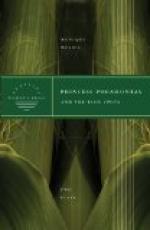“Now that we have christened the babe before it is born,” said Captain Newport, rising, “let us ashore and get to work to mark out the site of our Jamestown.”
All left the ship with the exception of a few sailors who remained on guard. After more discussion the Council picked out the spots for the government house, for the church, for the storehouse, while the artisans busied themselves with no loss of time in cutting down trees and clearing spaces for the temporary tents. The matter of a fort had not been broached, yet Smith, whose military knowledge showed him how vulnerable the island was, made no suggestion for its fortification.
He had strolled alone through the tangle of undergrowth, of flowering vines in which frightened mocking-birds and catbirds were darting, to the side of the island nearest the bank of the mainland.
“Here,” he said, speaking aloud as he had learned to do when he was a captive among the Tartars that he might not forget the sound of his own tongue, “here, on this side should be a bastioned wall with some strong culverins. A lookout tower at this corner and, extending around north and south, a strong palisade—that with vigilant sentries would ensure against attack except by water. If I—”
Then he stopped, his brow knitting. His disappointment had been a keen one, his pride was smitten to the quick. Never had he left England, never thrown in his lot with the new colony, had he known how he was to be made to suffer from jealousy, intrigue and neglect. As he stood gazing across into the deeper tangle on the opposite shore his thoughts were occupied with decisions for his future.
“Why should I remain here,” he cried aloud, “to be disregarded, when there is many an English ship that would be fain to have me stand on her poop, many a company of yeomen that would be main glad to have me command them? I am not of those men who are wont always to follow orders. I am made to give them. The world’s wide and this island need not be my prison. I will sail back on the Discovery and e’en be on the lookout for some new adventures.”
A rustling in the bushes behind him made him turn quickly. There stood Dickon and Hugh and Hob, three of the men who had come from his own part of the country, with whom during the long voyage he had often been glad to chat of their homes and the folk they all knew.
“Captain,” spake Dickon, “we have followed to have a word wi’ thee in secret. ’Tis said they have not given thee a place in the Council. Is’t true?”
“Aye,” answered Smith calmly.
“’Tis a dirty trick,” cried Hugh, and his comrades echoed him. “A dirty trick, but what wilt thou do now?”
“What would ye have me do, men?” asked Smith curiously.
Dickon was again spokesman, the others nodding approval of his words.




